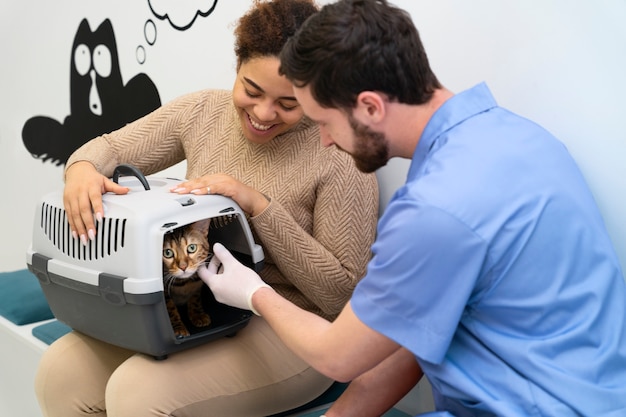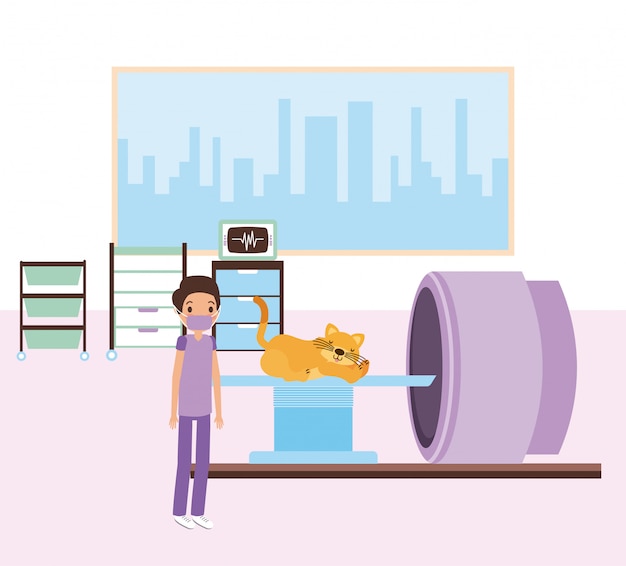How Diagnostic Imaging Supports Early Disease Detection in Pets

How Diagnostic Imaging Supports Early Disease Detection in Pets
As a devoted pet owner, you want nothing more than to see your companion live a long, healthy, and joyful life. Yet, many pet illnesses progress silently, showing no outward symptoms until the disease is well advanced. Early disease detection in pets is essential for effective treatment and brighter outcomes, which is why advanced veterinary imaging plays such a crucial role in preventive care. At 4 Paws Imaging, located at 2581 Ogden Avenue, Downers Grove, IL 60515, we specialize in providing high-quality diagnostic imaging services that help uncover hidden health issues before they become serious or life-threatening. Whether you're searching for a "specialty vet near me" or seeking the most advanced preventive veterinary imaging in Downers Grove and surrounding communities, our team of veterinarians is here to support your pet’s wellness.
In this blog, we will explore how diagnostic tools such as X-rays, ultrasounds, and CT scans are used for early disease detection in pets. You’ll learn how these technologies can reveal underlying conditions, what symptoms might indicate the need for advanced imaging, and why working with a specialty veterinarian near you can make all the difference in your pet’s health journey. We will also discuss the unique benefits of imaging for preventive care and guide you on when to seek specialized veterinary diagnostics in Downers Grove.
Understanding the Subtle Signs: When Is Advanced Imaging Needed?
Many pet owners wonder how to tell if their dog or cat could benefit from advanced imaging. Often, early signs of disease are easy to miss or may be mistaken for less serious issues. Subtle changes in your pet’s appetite, energy level, or bathroom habits can sometimes be the first clues that something is wrong. Symptoms that may warrant further investigation with veterinary imaging include unexplained weight loss, persistent vomiting or diarrhea, changes in urination, coughing, labored breathing, or painful movement. Additionally, pets with a family history of certain diseases or breeds known to be at higher risk for specific conditions may benefit from routine screening.
It is important to remember that some illnesses, such as heart disease or certain types of cancer, can remain hidden internally until they are advanced. This is why preventive veterinary imaging in Downers Grove is so valuable; it enables our veterinary professionals to identify problems before symptoms escalate. If you notice that your pet’s behavior shifts or you see any unusual symptoms, consulting your general veterinarian is the first step. They may then refer you to a specialist for advanced diagnostics if imaging is recommended.
Why Do Diseases Go Undetected? The Hidden Nature of Pet Illnesses
Unlike humans, pets cannot explain their discomfort or describe what feels wrong. Many animals instinctively hide signs of illness as a survival mechanism, making it easy for even attentive owners to miss early warning signs. Diseases such as kidney failure, tumors, heart abnormalities, or internal injuries often begin at a microscopic or cellular level. These conditions may progress quietly for weeks or even months before producing visible symptoms.
Another reason diseases remain hidden is the location of the problem within the body. For example, abdominal masses or heart conditions can develop deep within your pet’s organs, where they are not detectable through routine physical exams alone. Certain breeds are also genetically predisposed to health challenges that are difficult to diagnose without imaging, such as heart murmurs or thyroid disorders. This is where advanced diagnostic imaging, like abdominal ultrasounds, echocardiograms, or thyroid ultrasound, becomes invaluable in providing a clear, detailed look inside your pet’s body.
How Diagnostic Imaging Unveils Early Disease
The Role of X-rays, Ultrasounds, and CT Scans
Diagnostic imaging encompasses a range of technologies that allow our team of veterinary specialists to see beneath the surface of your pet’s body, revealing abnormalities that are not visible through a standard exam. X-rays are often the first imaging tool used and can show issues such as fractures, arthritis, heart enlargement, or masses within the chest and abdomen. Ultrasound uses sound waves to provide a real-time view of soft tissues, making it ideal for evaluating organs like the liver, kidneys, heart, or reproductive system. CT scans offer highly detailed cross-sectional images and are particularly valuable for detecting tumors, internal injuries, or complex anatomical problems.
For example, if your veterinarian suspects heart disease due to a heart murmur or irregular heartbeat, they may refer you to a specialty veterinarian near you for an echocardiogram or electrocardiogram to assess heart function in depth. Similarly, an abdominal ultrasound can help identify subtle changes in organ structure, early cancerous growths, or signs of chronic disease that are otherwise invisible.
Specialized Imaging for Unique Conditions
Certain conditions require targeted imaging solutions. Pregnancy ultrasounds can monitor fetal development and identify complications early, while thyroid ultrasound is essential for diagnosing thyroid disorders that can affect metabolism and overall health. Holter monitors provide extended heart rhythm tracking for pets with suspected arrhythmias. Each of these tools allows for more precise diagnosis and earlier intervention, giving your pet the best chance for successful treatment.
Taking Action: What Happens After Early Detection?
The Value of Early Diagnosis in Treatment Planning
Catching disease early through veterinary diagnostics in Downers Grove dramatically improves your pet’s prognosis and opens up a wider range of treatment options. When conditions such as tumors, kidney disease, or heart problems are identified in their early stages, interventions can be less invasive, less costly, and more effective. Your referring veterinarian and our specialty team will collaborate to interpret imaging results, develop a personalized treatment plan, and explain your options in detail.
Treatment approaches vary depending on the diagnosis. For example, early detection of a heart condition might mean your pet can be managed with medication and lifestyle adjustments, rather than requiring emergency intervention. In cases of cancer, finding a mass while it is still small can make surgical removal much more successful. For chronic diseases like kidney or thyroid disorders, early intervention can slow progression and greatly enhance your pet’s quality of life.
Our advanced imaging services are not only used to confirm a suspected diagnosis but also to monitor the effectiveness of ongoing treatment. Repeat imaging may be recommended to track progress and adjust therapy as needed. This collaborative approach ensures your pet receives the best possible care, every step of the way.
Preventive Veterinary Imaging: Proactive Steps for Healthier Pets
The Power of Screening Even Before Symptoms Appear
Preventive veterinary imaging in Downers Grove is not just for pets who are already showing signs of illness. Many pet owners choose proactive screening for breeds at higher risk of certain diseases, aging pets, or animals with a family history of health concerns. Routine ultrasounds or chest X-rays can act as an early warning system, revealing developing issues before your pet feels sick.
For example, older cats are prone to kidney disease, and a screening ultrasound can catch subtle changes before blood tests show abnormalities. Dogs with a genetic predisposition to heart disease may benefit from a screening echocardiogram. Even healthy pets can have hidden conditions that only show up on imaging, which is why working with a specialty veterinarian near you helps ensure your pet receives comprehensive, state-of-the-art preventive care.
Steps Pet Owners Can Take at Home
While advanced imaging is a powerful diagnostic tool, you play a vital role in your pet’s health. Regular wellness exams with your primary veterinarian, monitoring for behavioral changes, and maintaining up-to-date health records all support early disease detection in pets. If your veterinarian recommends specialized imaging, prompt follow-through can make a significant difference in your pet’s future. It is also wise to keep a journal of any symptoms or unusual behaviors to share with your veterinary team, as small details can often point toward the need for further diagnostics.
When Should You Seek Advanced Veterinary Diagnostics?
Knowing when to seek help from a specialty vet near you can be challenging, especially if your pet’s symptoms are mild or intermittent. Situations where you should consider advanced veterinary diagnostics in Downers Grove include persistent or unexplained symptoms, a diagnosis that requires more information, or when your primary veterinarian refers you for specialized imaging. Additionally, if your pet is a breed at higher risk for heart, kidney, or thyroid conditions, periodic screening may be recommended even before signs develop.
It is important to remember that early intervention is key to better outcomes. Delaying diagnostics can allow diseases to progress, reducing treatment options and increasing risks. If you are ever unsure, our veterinary professionals at 4 Paws Imaging are always available to discuss your concerns and help determine if advanced imaging is right for your pet.
Conclusion: Prioritizing Early Detection for Lifelong Health
Detecting disease early is one of the greatest gifts you can give your pet. With today’s advanced preventive veterinary imaging in Downers Grove, you have access to tools that can reveal hidden health threats long before they impact your pet’s quality of life. At 4 Paws Imaging, our experienced team of veterinarians and state-of-the-art technology are dedicated to supporting both you and your general veterinarian in safeguarding your companion’s wellbeing.
If you are searching for a "specialty veterinarian near me" or need guidance regarding early disease detection in pets, our team is here to help. Whether your veterinarian has recommended imaging or you simply want the peace of mind that comes with proactive screening, reach out to us today. Explore our full range of advanced imaging services or call (630) 746-1382 to discuss your pet’s needs. Together, we can ensure your pet enjoys a healthier, happier life in Downers Grove and surrounding communities.
This article is for informational purposes only and does not replace professional veterinary medical advice. Always consult your veterinarian for specific guidance regarding your pet’s health.
















